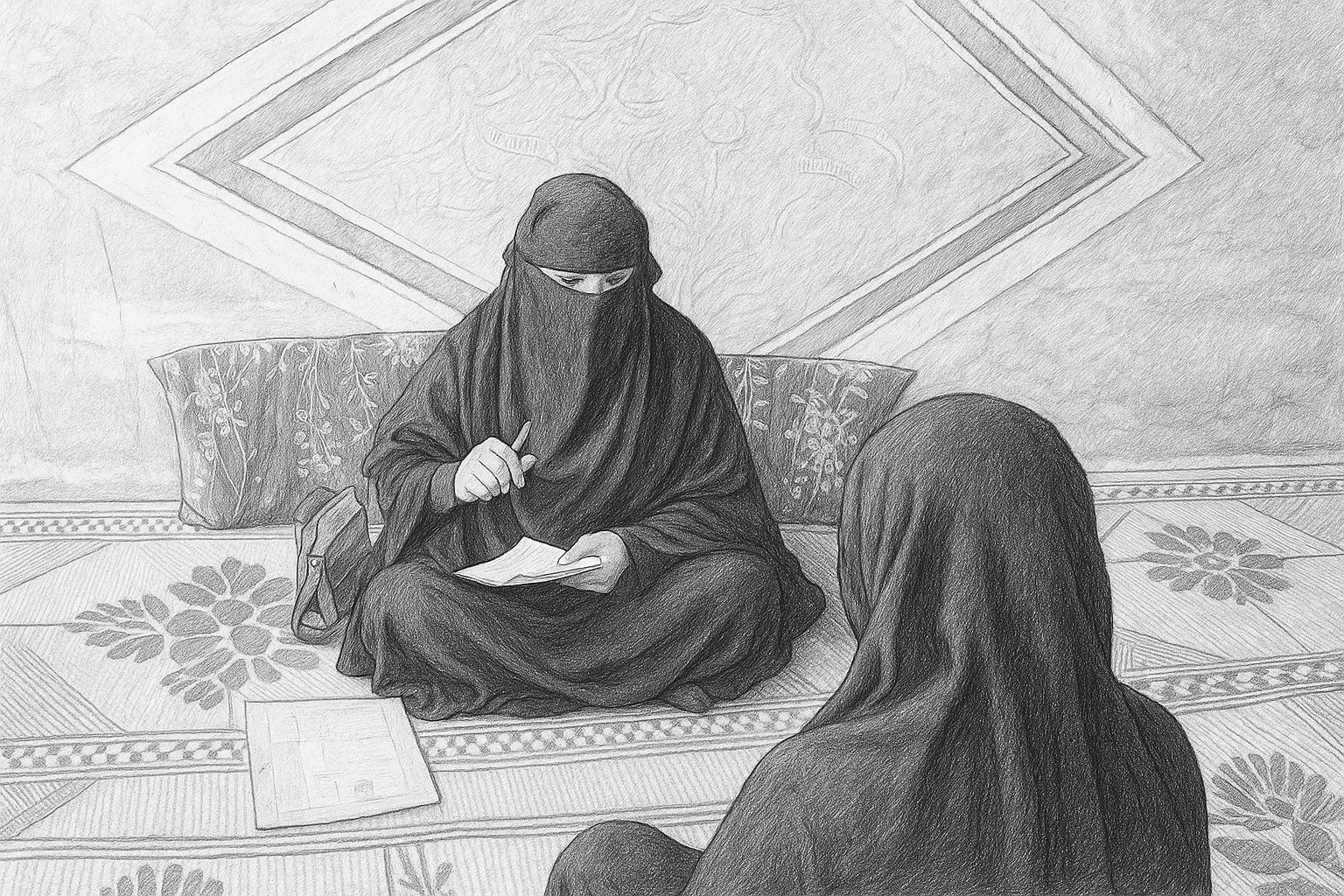
South24 Center via Artificial Intelligence
آخر تحديث في: 11-08-2025 الساعة 12 مساءً بتوقيت عدن
|
|
Between reconciliation sessions held in poor houses and legal companions for a woman seeking the custody of her children, the grassroots female lawyers stand on the front lines of some of the most sensitive issues within the Southern community
Reem Al-Fadhli (South24)
In the neighborhoods of Al-Shihr district in Hadramout governorate, Fatima Quboul spends her time moving from one house to another. She carries on her shoulders cases that aren't taken lightly by the law and can't be tolerated by the courts. For many years, she has never ceased playing her role as a legal assistant and community mediator, intervening to solve family disputes, consoling exhausted and isolated women, and seeking justice in difficult corners.
Fatima is one of the oldest grassroots female lawyers in South Yemen. Since the early 2000s, she has engaged in providing legal and psychological support to women and families lacking even the most minimum level of institutional protection.
Over the years, her work has not turned into a job; rather it has remained, as her daily, voluntary commitment, as she describes it, based on her sense of duty toward society.
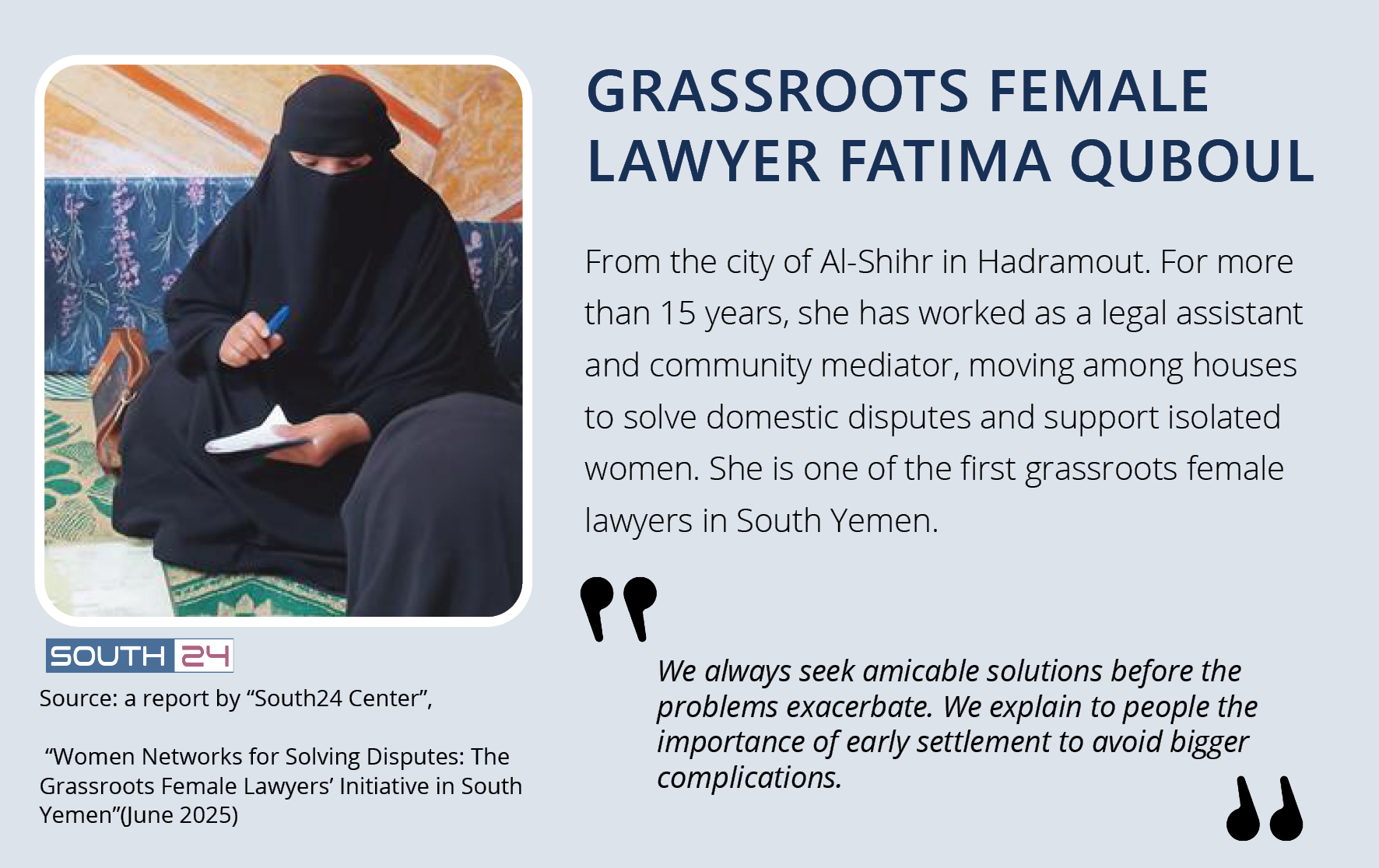
Fatima told ’South24 Center‘: “We always seek amicable solutions before the problem escalates. We explain to people the importance of early settlement to avoid greater complications.”
This philosophy, which reflects the depth of local understanding of the nature of disputes, constitutes one of the secrets behind the success of this initiative, which began in a simple way, but has grown into a female community network waging a silent battle for justice.
A Continuing Community Initiative
The idea of the ‘Grassroots Female Lawyers Initiative in South Yemen’ emerged between 2000 and 2002 as part of the Women's Legal Protection Project, conducted by the Yemeni Women's Union with support from Oxfam, in the cities of Mualla and Al-Shihr. The idea was simple but revolutionary in its essence: To train female leaders from local communities on the Personal Affairs Law and dispute solving mechanisms, and then enable them to play defensive and community roles to protect women from violence and abuse.
Once the initial project ended, it was clear that the experience could not simply stop. Thus, the initiative has evolved from an institutionally backed activity into a sustainable, voluntary community effort. Later, the Yemeni Women’s Union implemented similar programs over the subsequent years, and other programs have been carried out in Lahj governorate as an extension of the idea.
According to Alyaa Al-Hamidi, Head of the Legal Department at the Yemeni Women’s Union in Hadramout, “The women in these programs are selected based on certain specific criteria, most notably social acceptance, integrity, honesty, an education level that allows for training, and the ability to maintain the confidentiality of people's cases. Becoming a member of the Women’s Union is not a condition; rather it has opened the door for any active woman in the society.”
One factor behind the early success of the initiative has been the cohesive social nature in the targeted areas. The close-knit nature of the social fabric has helped in accepting the idea of a woman from the same neighborhood intervening to resolve disputes. Furthermore, over time, the experience has been embraced as a source of trust and balance within the neighborhood.
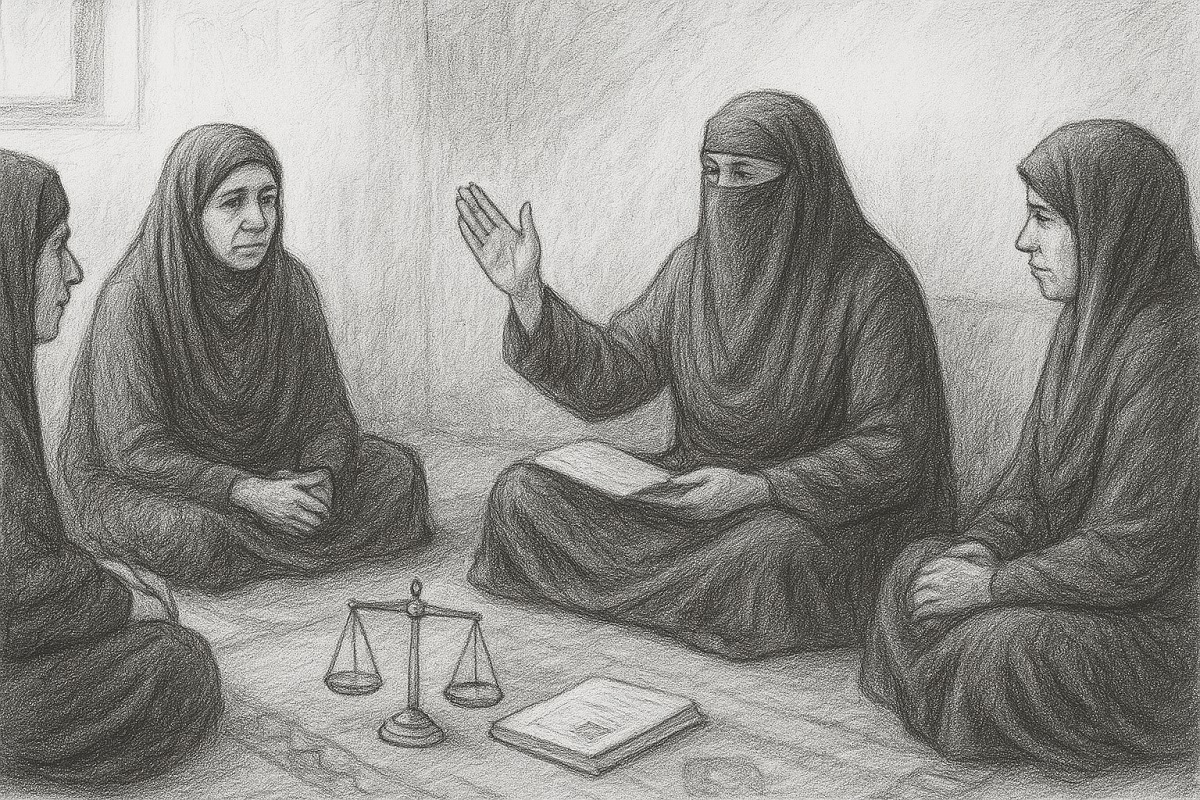
The grassroots female lawyers provide legal advice and consultations to women in houses, neighborhoods, and rural areas.
The model adopted by the initiative relies on selecting one woman from each neighborhood to be in direct contact with her social surroundings. This strategic choice is not based on mere geographical distribution but serves as an effective mechanism to enhance trust and facilitate access, especially in cases of family disputes and domestic violence, which require sensitive and swift intervention before being referred to the courts.
Al-Hamidi told ‘South24 Center’ that “each female team works under the supervision of a certified female lawyer who provides legal consultations and intervenes, when necessary, to escalate cases to the courts.”
This dual model - combining “legal grassroots assistance” with “official legal supervision”- has enabled the initiative to maintain a balance between community legitimacy and legal authority. It has given it the flexibility to operate within society as well as the ability to protect rights before the competent authorities.
What do Grassroots Women Lawyers do?
Between reconciliation sessions held in poor homes and legal companions for a woman seeking the custody of her children, the grassroots women lawyers stand at the front lines of some of the most sensitive cases within the Southern community. Their roles are not limited to raising public awareness but include direct intervention to resolve family disputes, provide legal assistance, and coordinate with judicial authorities when necessary.
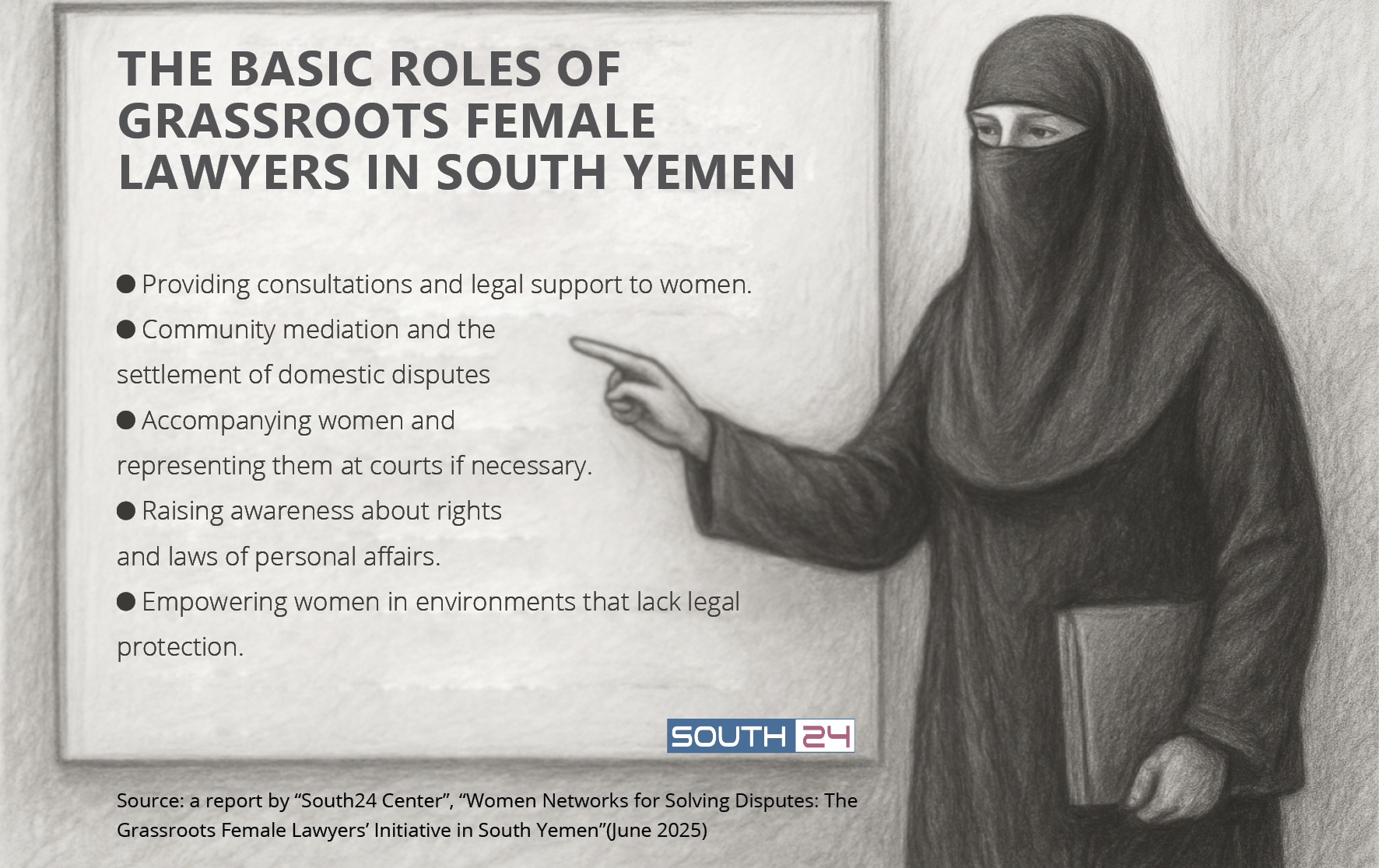
Alyaa Al-Hamidi pointed out that the female legal assistants “proactively intervene in sensitive issues before they are escalated to judicial or security authorities, especially those related to domestic violence. They have succeeded in containing many issues within the community in a way that maintains the privacy of individuals and prevents defamation.”
This emphasis on privacy is a core value in the work of the Grassroots Female Lawyers. Many families prefer resolving cases without having to enter the maze of courts, especially in light of the slow procedures and the lack of public trust in state institutions, particularly in the rural areas or those that lack nearby courts.
Parallel Justice
In Lahj governorate, where this inspiring experience has established itself, grassroots community lawyer Haneen Mohammed emphasizes that most of the cases she follows are related to women's rights, such as alimony, domestic violence, custody cases post-divorce, and inheritance claims.
She told ‘South24 Center’ that “courts often favor those who have influence or money. This makes women, especially those who are economically poor, suffer a lot in order to gain their most basic rights.”
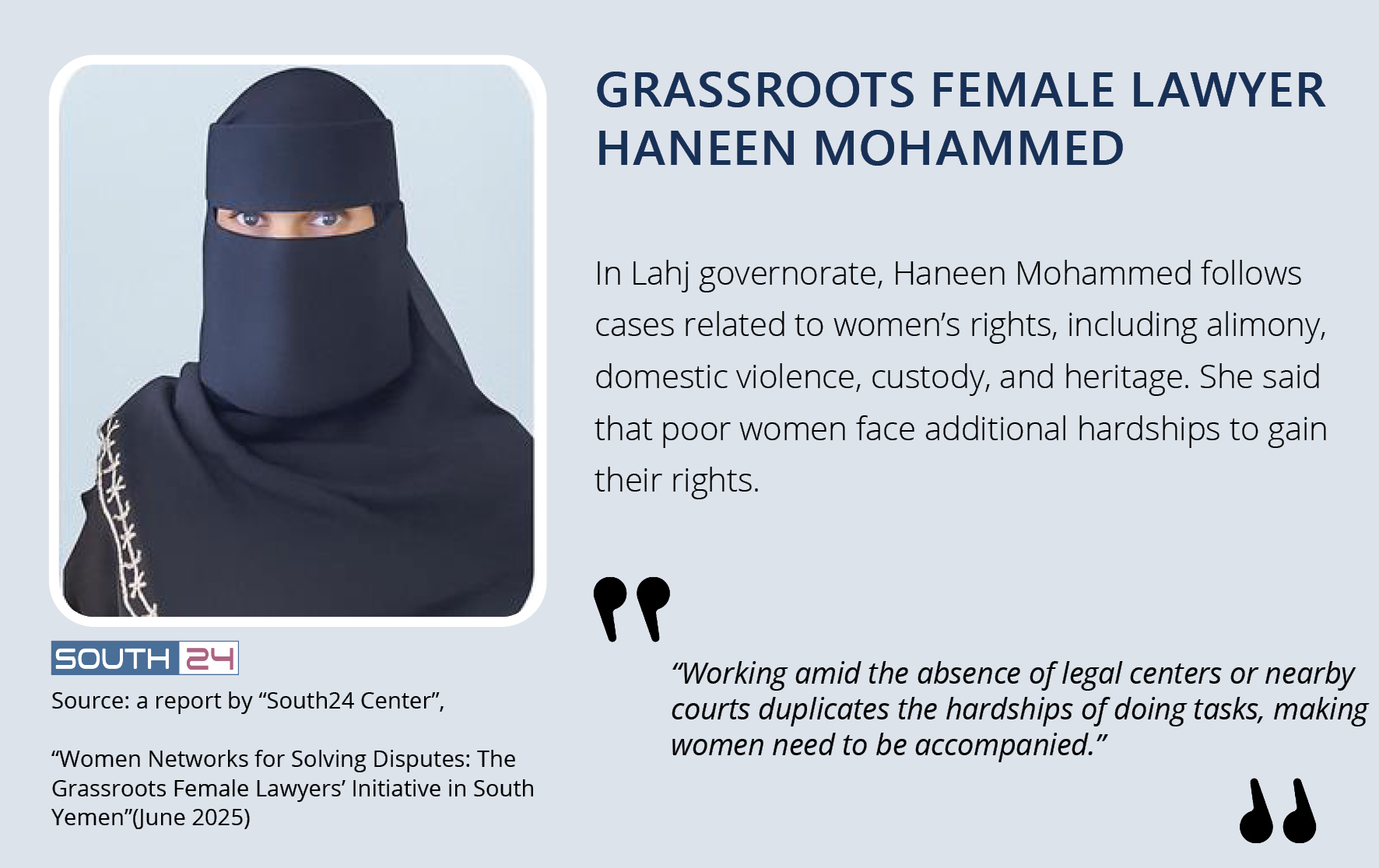
What Haneen said reflects a double legal struggle as women in these environments not only lack legal knowledge, they also lack the tools to demand it.
In this regard, Nasra Hamed, Head of the charitable Developed Social Society in Lahj, told ‘South24 Center’, that “Most women in Lahj lack adequate knowledge of the laws and do not know their rights, whether related to inheritance, education, or choosing a life partner.”
The grassroots women lawyers do not just wait for crises to happen, they also work actively to mitigate them by raising awareness. They organize awareness sessions at social gatherings, and distribute guidelines about the importance of supporting documents such as identity cards, marriage contracts, and children’s birth certificates. These small details can make a big difference when women face legal disputes.
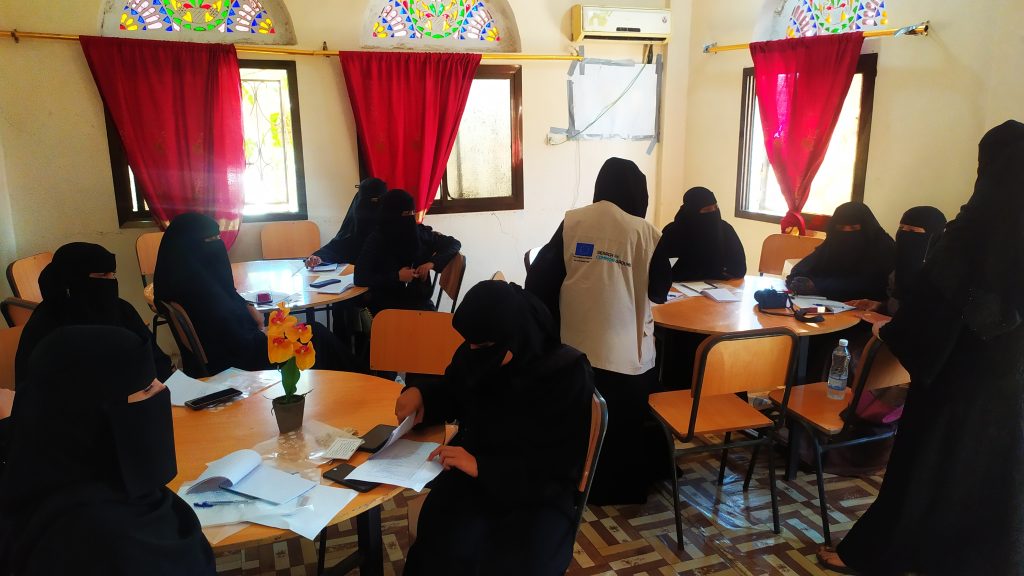
Women participate in a training course on legal counselling and women's rights as part of a project supported by the European Union and ‘Search for Common Ground’, in Al-Hawtah, Lahj, South Yemen- December 2, 2022 (Algomndan News).
Power Conflict Challenges
Despite field successes achieved by grassroots female lawyers, their path has not been an easy one. Official recognition of their roles was long delayed until some of them began to be gradually integrated into the community committees affiliated with local authorities. Such a merger, even if not based on a clear legal rule, has constituted an important shift in expanding the umbrella of community protection for their roles.
Hadramout governorate is considered the most advanced in this regard in South Yemen.
In this regard, Madina Adlan, Member of the Supreme Council of the Hadramout Inclusive Conference, told ‘South24 Center’: “We provide support to these women. Some of those who received legal training have been already merged within the structures of the community committees affiliated with the districts’ authorities. They play active roles through their membership in these committees at the neighborhood level.”
This development has provided the grassroots women lawyers with a symbolic official recognition, boosting the community’s trust in them. However, the reality of their work is fraught with many challenges, particularly the absence of institutional coordination with official authorities and the lack of identification cards or documents that would enable these women to intervene in disputes with legal authority.
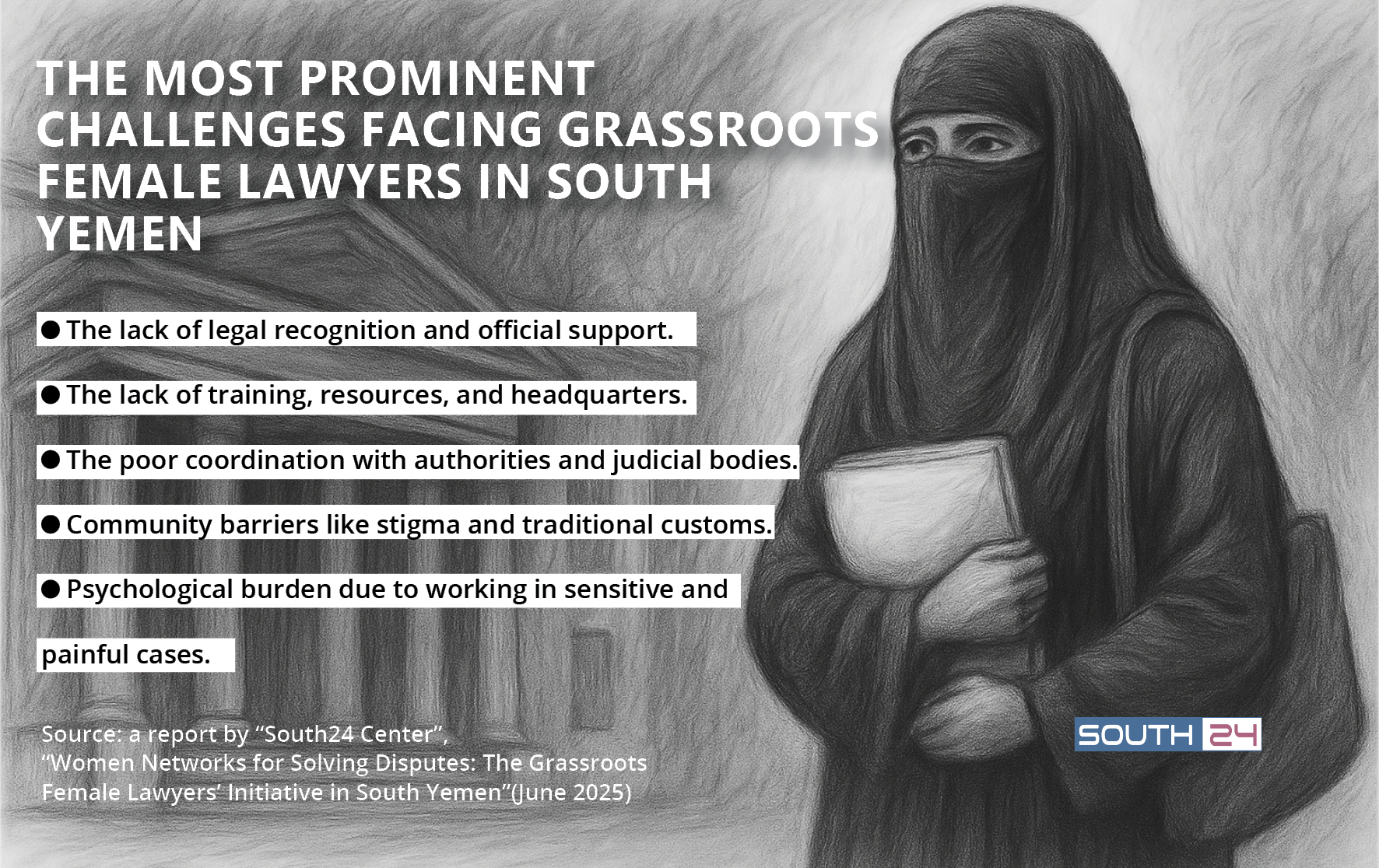
Fatima Quboul, a grassroots lawyer from Al-Shihr, says: “It has become an urgent necessity for grassroots women lawyers to obtain formal identification from the relevant authorities such as a card or document that authorizes them to intervene in community cases. This would facilitate their work and enhance their credibility in the eyes of the public.”
She added: “Sometimes we face difficulties in gaining the trust of the disputing parties or in coordinating with authorities and tribal leaders. The lack of such support affects the speed of case resolution and the ability to find lasting solutions.”
A Social Term or a Legal Title?
Despite the use of the term “Grassroots Female Lawyers” in society and media, the legal reality is different. Alyaa Al-Hamidi said that this term doesn't reflect any official legal status.
She explained: “The use of the term ‘grassroots female lawyers’ is not legally aligned with the actual role these women play, as they do not have a legal status as licensed lawyers. Therefore, the union has adopted the term ‘legal assistants’ to refer to them.
This clarification highlights a duality in the description: on the one hand, society acknowledges their practical role as lawyers who provide support, advice, and negotiation services. On the other hand, the law does not grant them any official title.
Needed Support
In 2023, the United Nations Population Fund (UNFPA) issued a report stating that 7.1 million women in Yemen are in urgent need of services to prevent gender-based violence. This alarming figure underscores the vast gap between what currently exists and what is needed to ensure protection and justice for women. It also highlights the importance of developing grassroots feminist initiatives, especially the Grassroots Female Lawyers Initiative in South Yemen.
Madina Adlan believes this growing need demands a practical response. She said: “Civil society organizations can help train more women to serve as legal assistants, in order to fill the legal gaps in local communities.”
She noted that the Hadramout Commission for Conflict Resolution is currently implementing a training program targeting female members of community committees in the field of dispute resolution in an effort to strengthen local peace and empower women in legal and social mediation.
Support is not limited to training. The grassroots female lawyers have themselves voiced clear demands, including:
● Providing officially recognized offices, affiliated with the local authorities or official institutions, as advocated by Fatima Quboul, to serve as centers for legal reconciliation.
● Offering incentives to ensure the continuity of their work, as the initiative currently relies on individual volunteering which threatens its sustainability in the long run.
● Integrating grassroots female lawyers into the official programs of state institutions and organizations, enabling them to represent women for free in family cases and providing legal coverage that helps sustain their work.
In her recommendations, Alyaa Al-Hamidi stressed “It is important to organize activity courses and regular experience exchange sessions for legal assistants to improve their performance and service quality. We also need sustained legal and community support to ensure lasting impact.”
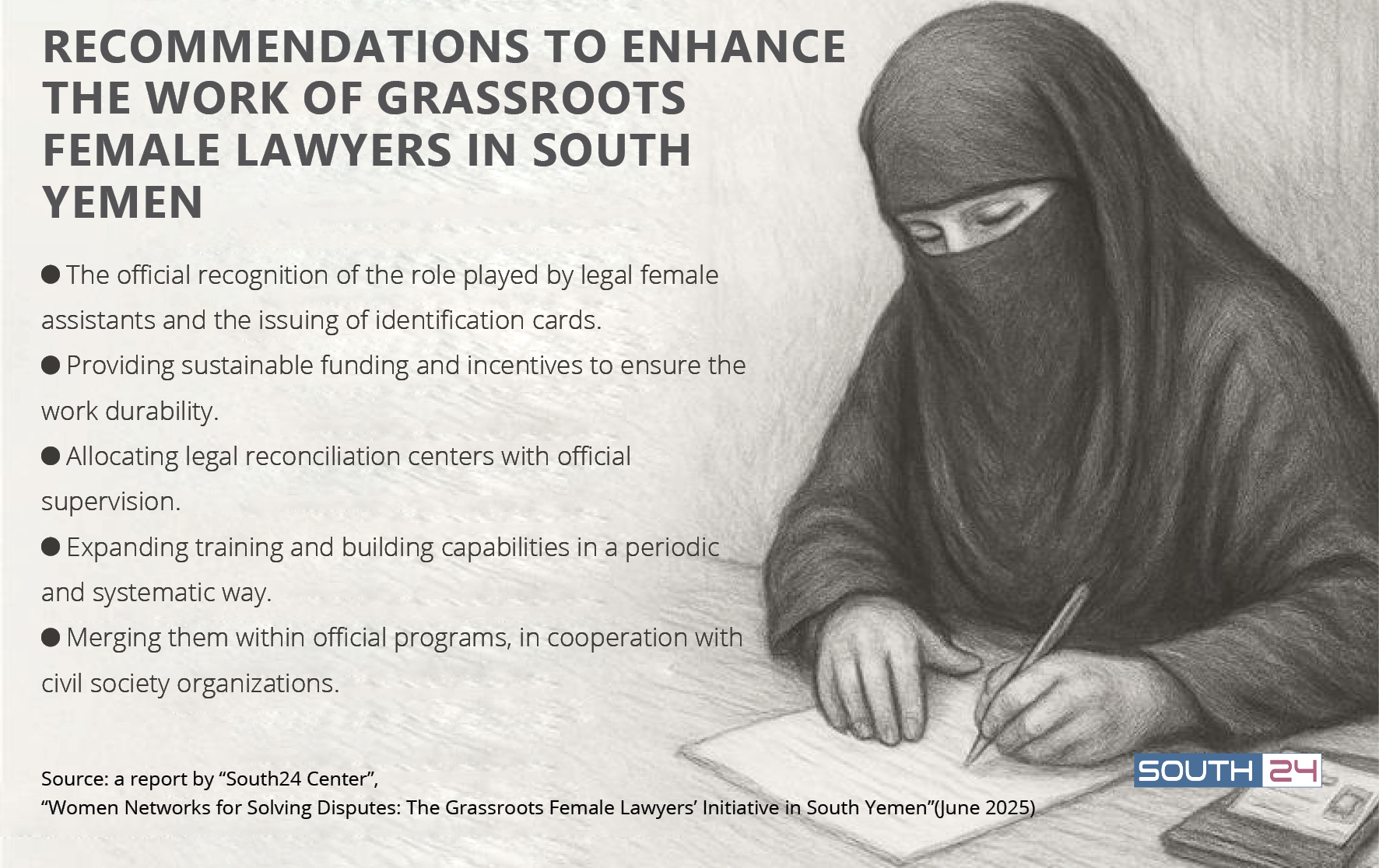
Haneen Mohammed emphasized the need for institutional support, stating that grassroots female lawyers require: “Protection and institutional support, in addition to being empowered to follow up on cases officially and with clear legal backing.”
Nasrah Hamed underscored the importance of the involvement of official bodies and civil society organizations. She said: “This collaboration requires organizing the work in line with regulations and laws, as well as providing various forms of support—whether material or moral—in addition to organizing programs for legal awareness and empowerment.”
Given the success of the Grassroots Female Lawyers Initiative in South Yemen, it can be said that this effort is not merely about supporting a local women’s movement. It is about supporting broader social stability. It protects women from collapse and keeps the thread of hope taut for a more just and inclusive future.
Empowering these women with legal knowledge and the necessary skills is a cornerstone for raising community awareness. It enhances their ability to effectively deliver human rights messages and persuade both women and decision-makers about the importance of reaching fair solutions to disputes, aligning with the social and cultural specificities of Yemeni society.